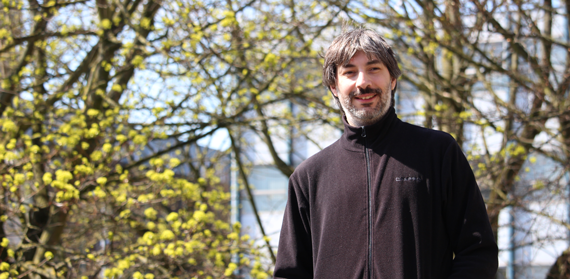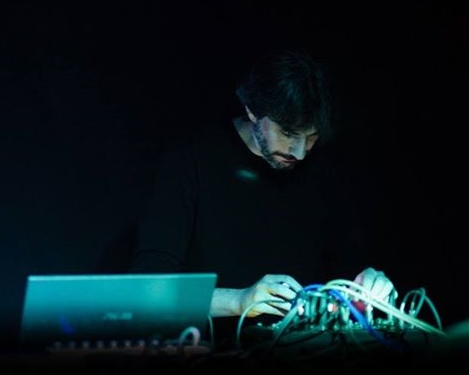Guest post by Yiorgis Sakellariou
I am a composer of electroacoustic and experimental music. If after reading these two strange words beginning with the letter e you already feel a bit disengaged, or even bored, please do not close this tab. Instead of focusing on the setting of definitions, the investigation and invention of techniques and generally on the “how” of composition, my research is in search of meaning, asking about “why” and “what”. In other words, who is performing this music, to whom, where and what is its purpose and social status in contemporary society? And to borrow musicologist’s Christopher Small question: “what’s really going on here?”- In this case “here” refers to electroacoustic music concerts. These questions are not only raised in theory. I am actively looking for possible answers through composing and performing. Furthermore, I am examining additional ways to trigger an effective and ongoing dialogue about the practice (from email conversations to workshops) and, above all, to explore the relationships established through it. Not only between fellow practitioners and scholars, but, moreover, between composer and audiences, between humans who share a, hopefully profound, experience: that of listening to music.
I have been offered a scholarship from the Faculty of Arts and Humanities at Coventry University which allows me to fully focus on the research and its requirements. I am in an almost 24/7 process of thinking, reading, writing and composing, constantly raising questions about meaning with the aim of triggering holistic and participatory experiences. Initiated in electroacoustic music composition practice, my research generates ongoing practical and theoretical responses with the purpose of creating outcomes open to diverse understandings. Therefore, this research is practice-led, conducted in a post-positivist and qualitative methodological framework as it attempts an interpretation of electroacoustic music practice that will remain open to multiple emerging perspectives and revised meanings.
As a PhD researcher, I have several obligations and prerequisites. Modules, writings, participation in conferences as well as annual exams aiming at monitoring the progress of the research, together with typical procedures such as enrolments and documentation of engagement are mandatory. Still, they do not add any significant pressure. After all, as part of the academic studies it is expected to demonstrate a level of commitment and responsibility. However, this is not an easy ride. If the context of a PhD research is understandable and controllable, the content, well… this is a totally different story. The negotiated ideas, the creative endeavours, the exposure of the artistic outcomes to the public, often generate a stressful condition, leading to doubt and questioning. Dealing with essential and fundamental notions of creativity and, in extend, of being-in-the world, is thrilling and challenging yet can also be dangerous as it may lead to dead-ends, disappointment and a great deal of frustration in general. Part of the PhD training involves learning to face these problems and finding effective ways of moving forward, of overcoming emotional obstacles and philosophical and ontological blackouts.
At this point it is reasonable to assume that there is a question hovering while reading this: is composition research? How can the experience of listening be translated into words or quantifiable data? How can we describe the ineffable? These questions are part of a current discourse about the position of the arts within the academia, an “an uneasy relationship”, as scholar and music theorist Henk Borgdorff has described it. Despite the general acceptance of the post-positivist research methods within an academic environment, issues of subjectivity in critical analysis are still raised and experiential knowledge is subject to criticism. Artistic research within a scientific framework (hypothesis, background, methodology, outcomes) can be stimulating and lead to original results, however it might appear unclear and unjustified as the argument of perceiving the artwork as knowledge can still be debatable.
I am aware that some of my research questions will, or even must, remain unanswered and that perhaps my methodology might seem incomprehensible or non-conclusive. The much desired impact of the work will not be measurable and probably not even clearly defined, not only because it would be impossible to do so but more as a result of a conscious decision which aims to emphasize on the unforeseen, the mysterious and the unknown. It is my proposition that this is exactly what initiates the curiosity, the challenge and the excitement of electroacoustic music. After all, perhaps art’s purpose and quality is to suspend theory and meaning in favour of expanding, mystifying and transcending our physical reality and mundane life.
Therefore, this research proposes to re-vision experimental and electroacoustic music as a tool to connect the mystical with the scientific, the intuitive with the methodical, the imaginative with the real. Through sound and listening, the concert can be transformed from a spectacle designed for passive observers and consumers to a ritual which can provide the conditions to disregard postmodern cynicism and the frenzied overflow of information and instead discover and express archetypical emotions and metaphysical concerns.





Comments are disabled